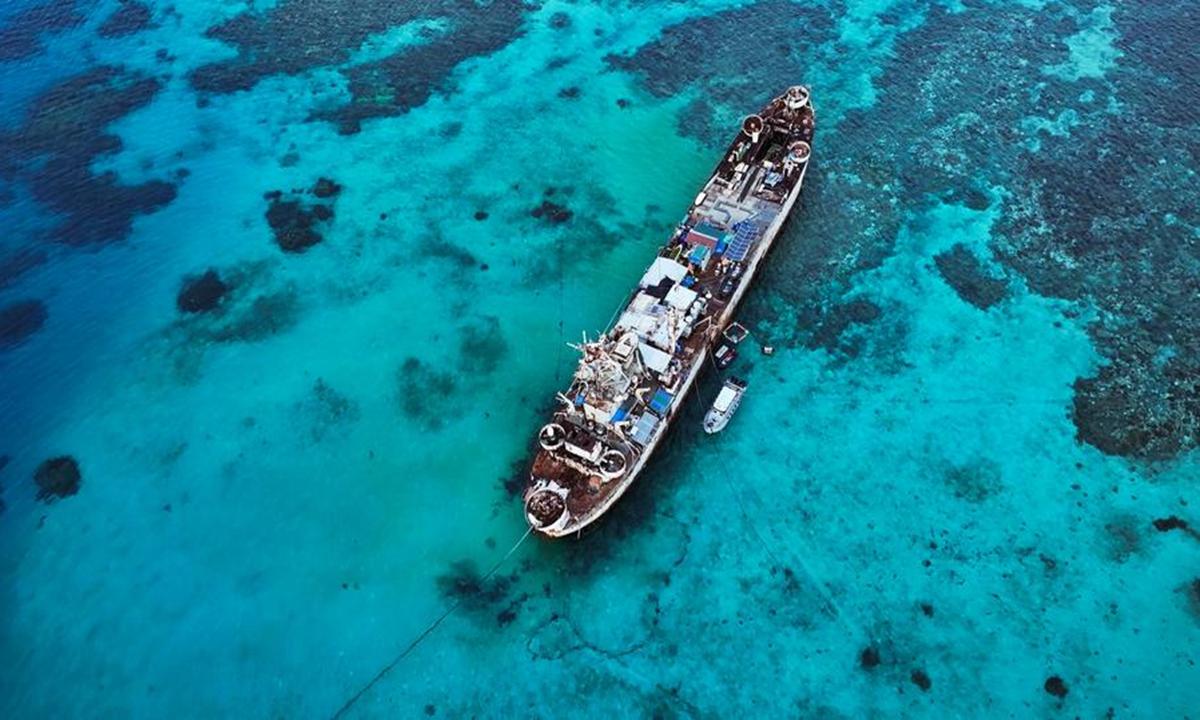By Ding Duo

This screenshot from a video taken on July 1, 2024 shows the Philippine grounded tank landing ship BRP Sierra Madre (LT-57) at China's Ren'ai Jiao. Photo: Xinhua
According to the Chinese Foreign Ministry on Sunday, China and the Philippines reached an understanding on managing the situation at Ren'ai Jiao (also known as Ren'ai Reef) in the South China Sea. This is mainly related to the principles and practices that the Philippines needs to abide by when providing basic living supplies to the personnel on the warship illegally grounded at Ren'ai Jiao of China's Nansha Qundao (Nansha Islands) for a long time.
This is a progress made by the two sides in utilizing the bilateral consultation mechanism on the South China Sea issue to control the friction and avoid escalation of the crisis. It demonstrated that Beijing's comprehensive countermeasures against Manila's provocations in the region for more than a year are working in a sustained manner, resulting in the Philippines returning to direct negotiations and consultations.
Judging from the press release issued by the Chinese Foreign Ministry, China's position on managing the situation at Ren'ai Jiao has not changed. The Philippines has inevitably informed its ally -- the US, of the situation before the agreement with China was reached, and is expected to continue to keep Washington updated before further agreements are made. Seeing China and the Philippines make efforts to manage their conflicts in the South China Sea through institutionalized consultation, the US, which has long been "fanning the flames" and "fueling the fight" over the South China Sea issue, is inevitably not necessarily happy about this development.
The reason why an understanding can be reached is inextricably linked to the effective operation of the China-Philippines Bilateral Consultation Mechanism (BCM) on the South China Sea. Seven years ago, the two countries agreed to establish the BCM to conduct regular consultations on their respective concerns involving the South China Sea to avoid complicating and escalating the disputes as well as affecting the peace and stability of the South China Sea.
The new "deal" is a concrete manifestation of some consensus achieved by China and the Philippines. It also clearly shows that Manila's attempts to stir up trouble and exert pressure on China through "microphone diplomacy," "gray zone tactics" and "exposure strategy" on the South China Sea issue did not work, and that direct negotiation and consultation between the two countries concerned is the only way.
The new "deal" does not change the rights and wrongs of the maritime situation at Ren'ai Jiao. The reasons that led to the incident are clear: the Philippines broke its promise. Manila not only failed to tow away the illegally grounded warship, but also insisted on sending construction materials to this warship in an attempt to make large-scale reinforcement and then achieve permanent occupation of Ren'ai Jiao. The new "deal" does not recognize the legality and legitimacy of the Philippines' relevant activities, nor does it mean that the Philippines can "legalize" its actions at Ren'ai Jiao in the name of "exercising jurisdiction."
Over the years, China has exercised great restraint and patience in handling the situation at Ren'ai Jiao, and demonstrating goodwill and sincerity in managing maritime differences. During the previous administration of the Philippines, China and the Philippines reached a "gentleman's agreement" on the management and control of the situation at Ren'ai Jiao. After the current administration came to power, China has repeatedly notified and negotiated with high-level officials of the Philippine government on matters related to the "gentleman's agreement" and has kept on finding ways to manage differences with the Philippines through dialogue and consultation.
In September 2023, China invited the Envoy of the President to China for Special Concerns of the Philippines to Beijing for consultations. The two sides reached an internal understanding on how to manage and control the situation, which was approved by the Philippine leadership. In early 2024, China repeatedly negotiated with the Philippine side through diplomatic channels to reach a "new model" regarding the management and control of the situation at Ren'ai Jiao.
Given the fact that the Philippines once denied the "gentleman's agreement" of the previous government at the expense of disparaging the country's reputation, and also reneged on the internal understanding and "new model," China will look to what extent this new "deal" be seriously, completely and effectively implemented by the Philippines. If the Philippines abuses China's flexibility and patience based on the humanitarian spirit on the Ren'ai Jiao issue regarding the new agreement as an expedient, and then goes back on its word, it will definitely pay a heavier price for its repeated mistakes.
The author is a deputy director of the Institute of Maritime Law and Policy at the National Institute for South China Sea Studies.













